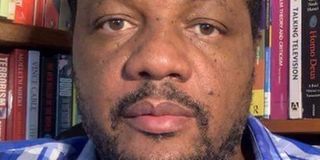Zimbabwe journalist Hopewell Chin’ono denied bail amid UN concerns

What you need to know:
- Journalist Hopewell Chin’ono was arrested alongside opposition politician Jacob Ngarivhume for allegedly inciting protests against alleged corruption in high places.
- President Emmerson Mnangagwa has been accused of using the lockdown restrictions to entrench his power and closing the democratic space.
- Tension is rising in Zimbabwe over a deteriorating economy, with inflation now topping 700 per cent.
A Zimbabwean court on Friday denied bail to a prominent investigative journalist accused of inciting public violence.
This came as the United Nations’ rights body expressed concern over a clampdown on dissent in the southern African country.
Hopewell Chin’ono, who was arrested on Monday, will appear in court again on August 7.
The journalist was arrested alongside opposition politician Jacob Ngarivhume for allegedly inciting Zimbabweans to join protests on July 31 against alleged corruption in high places.
UN CONCERNS
Friday’s bail ruling coincided with a statement from the United Nations High Commission for Human Rights, which said Zimbabwe was using the Covid-19 pandemic to clampdown on freedom of expression, peaceful assembly and association.
“Among the latest incidents, investigative journalist Hopewell Chin'ono was arrested on July 20 and charged with inciting the public, after he tweeted his support against government corruption and worsening economic conditions,” the UN body said.
“Jacob Ngarivhume, an opposition leader, who has been calling for protests on July 31, was also detained and similarly charged. Merely calling for a peaceful protest or participating in a peaceful protest are exercises of recognised human rights.
“We are concerned at reports of police using force to disperse and arrest nurses and health workers for infringing lockdown restrictions as they were trying to protest for better salaries and conditions of work.”
PRESIDENT CRITICISED
President Emmerson Mnangagwa has been accused of using the lockdown restrictions to entrench his power and closing the democratic space.
The Zimbabwean leader this week introduced a dusk to dawn curfew, which he said was meant to slow down the spread of the coronavirus, but critics said the measures were meant to curb dissent.
The UN body said it had witnessed a worrying pattern that started in May with the alleged abduction of an opposition MP and two activists who were reportedly sexually abused after they took part in a demonstration.
Police last month charged the women with participating in the protests and allegedly faking their abduction.
“It is clear that Covid-19 has added greatly to the challenges Zimbabwe faces amid a deteriorating economy and placed a further burden on an already struggling health sector,” the agency said.
“While recognising the government’s efforts to contain the pandemic, it is important to remind the authorities that any lockdown measures and restrictions should be necessary, proportionate and time limited, and enforced humanely without resorting to unnecessary or excessive force.
“We encourage the government to engage with civil society and other stakeholders to find sustainable solutions to grievances while ensuring that people’s rights and freedoms are protected in accordance with Zimbabwe’s human rights obligations. These include the responsibility of the state to guarantee economic, social and cultural rights.”
TENSION RISING
Tension is rising in Zimbabwe over a deteriorating economy, with inflation now topping 700 per cent.
Health workers have been on strike for almost a month demanding payment in foreign currency at a time when Covid-19 cases are increasing at an alarming rate.
The country has recorded over 2,000 cases of the disease with 26 deaths.





